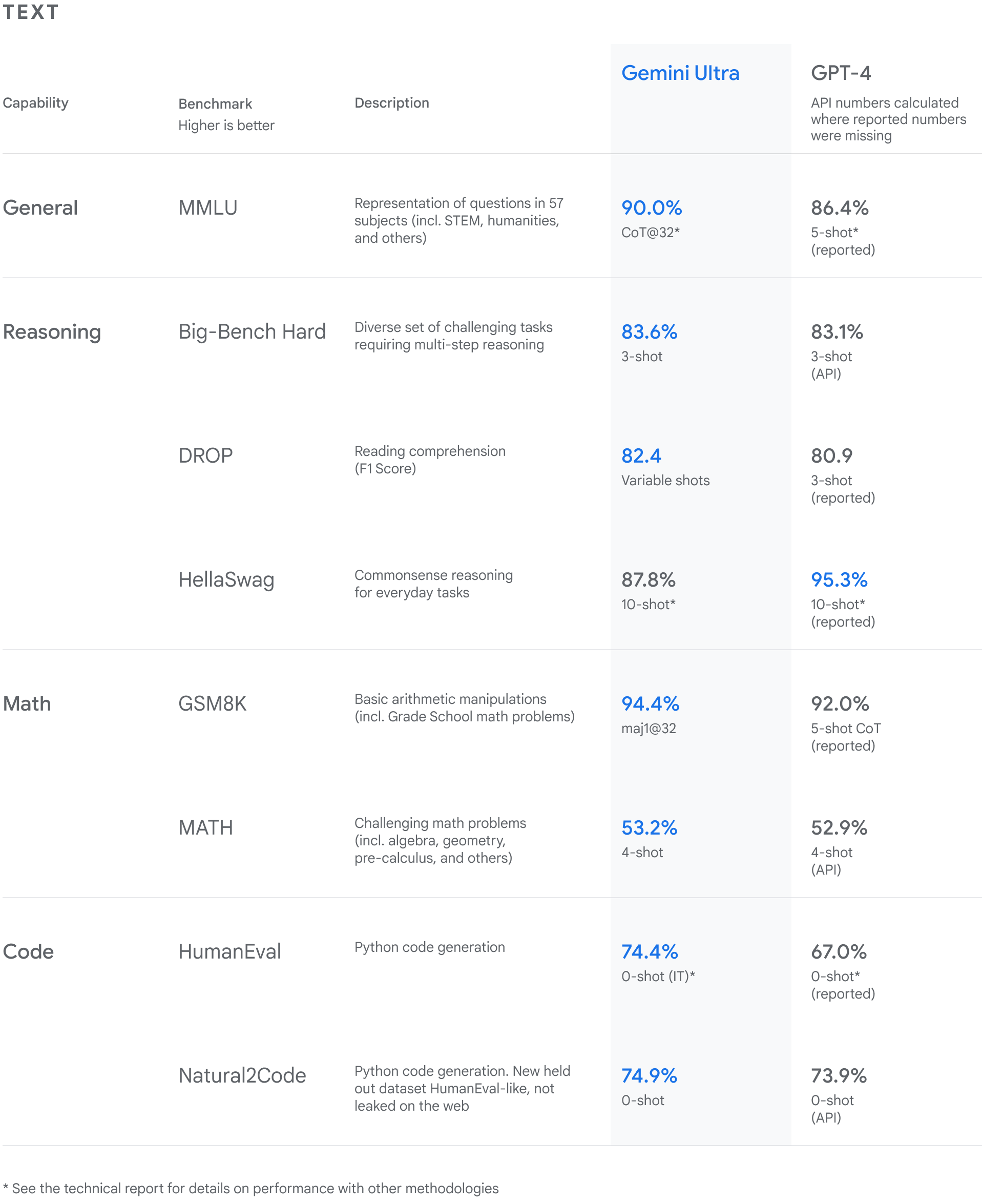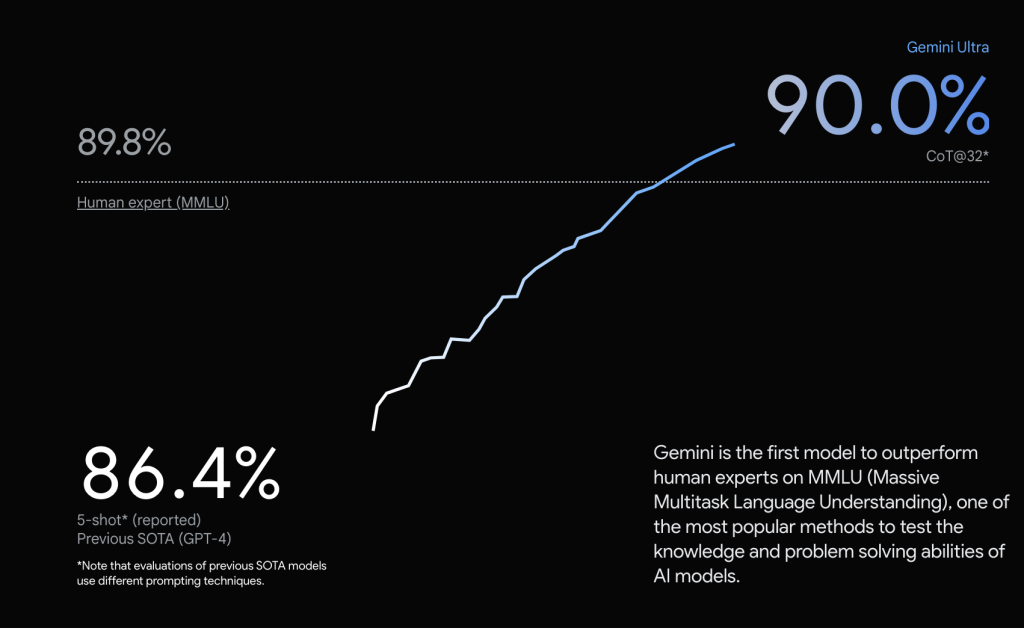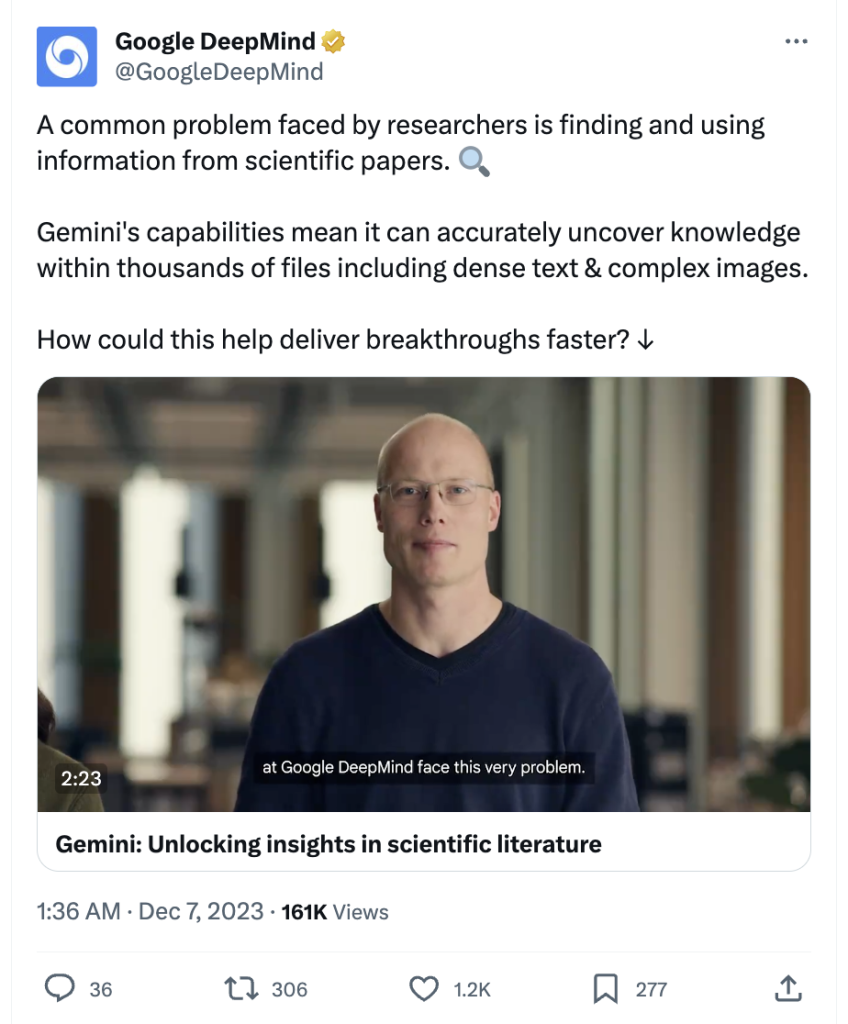Introducing A Benchmark Model Gemini By Google
Google Gemini AI Launched
Google is a step closer to this vision as they have introduced Gemini, the most capable and general model they have ever built.
With Gemini, Google’s most capable and general model yet, we are moving forward with our adventure. Gemini achieves state-of-the-art performance across several prominent benchmarks. Ultra, Pro, and Nano are the three sizes that were prioritized in our initial release, Gemini 1.0.
Gemini 1.0, their first version, for three different sizes:
- Gemini Ultra — our largest and most capable model for highly complex tasks.
- Gemini Pro — our best model for scaling across a wide range of tasks.
- Gemini Nano — our most efficient model for on-device tasks.
These models mark the beginning of the Gemini era and the first step towards achieving the goals they set out to achieve when we established Google DeepMind earlier this year. The advent of these new models is a culmination of their most extensive scientific and technical endeavors to date. What lies ahead, and the potential that Gemini will bring to people everywhere, fills me with true excitement.
Read: State Of AI In 2024 In The Top 5 Industries
Google says Gemini beats GPT-4 in 30 out of 32 benchmarks
There is a chance to enhance people’s lives, speed up human development, and expand scientific knowledge with every technological innovation. Millions of people are now utilizing generative AI across their products to accomplish things they couldn’t even a year ago, from finding answers to more complex questions to using new tools to collaborate and create. We’re nearly eight years into our journey as an AI-first company, and the pace of progress is only increasing. Companies and startups all across the globe are using our AI tools to expand, and developers are utilizing their models and infrastructure to create new generative AI applications.

The New Flagship AI Model- Google Hopes Will Beat GPT-4
The MMLU (massive multitask language understanding) test measures both general knowledge and problem-solving skills across 57 domains, including mathematics, physics, history, law, medicine, and ethics. Gemini Ultra achieved the first-ever model score of 90% on this test, surpassing human specialists. Gemini is now able to utilize its reasoning powers to ponder more thoroughly before answering tough questions, according to its new benchmark method to MMLU. This greatly improves its performance compared to only utilizing its initial impression.
They have been examining the performance of our Gemini models across a range of tasks and testing them exhaustively. On 30 out of the 32 commonly used academic benchmarks for large language model (LLM) research and development, Gemini Ultra outperforms the current state-of-the-art findings. These benchmarks cover a wide range of applications, from mathematical reasoning to natural picture, audio, and video understanding.
Read: The Beauty Of AI In The Wood Industry
Gemini Is More Than a Single AI Model
There are three different sizes of the Gemini model.
1. Gemini Nano:
The first is the Gemini Nano, an artificial intelligence model developed by Google that is small and optimized for mobile devices, in particular the Pixel 8. Effortless completion of on-device chores is made possible by this architecture, even while not connected to the internet. Gemini Nano has robust AI capabilities—from summarizing text material to proposing pertinent answers in chat apps—without depending on external servers, guaranteeing a seamless and responsive user experience.
2. Gemini Pro:
The most recent iteration of Gemini AI, Gemini Pro is starting to lay the groundwork for Bard and is expected to power many other Google AI services in the future. Our most recent AI chatbot, Bard, is powered by Gemini Pro, which runs on Google’s data centers. Quick responses and an impressive capacity to comprehend complicated inquiries are the results of this cutting-edge technology.
3. Gemini Ultra:
Google’s most potent LLM is Gemini Ultra. Data centers and corporate applications are believed to benefit most from their ability to handle complicated jobs. Gemini Ultra has not been released to the public just yet, but according to Google, it outperforms “current state-of-the-art results on 30 of the 32 widely-used academic benchmarks used in large language model (LLM) research and development.” Thus, it performs better than competing LLMs on the majority of benchmark exams. After the present testing phase concludes, Gemini Ultra, which is designed for complicated jobs, is likely to be released.
Read: 4 Common Myths Related To Women In The Workplace
Integrate Gemini models with Google AI Studio and Google Cloud Vertex AI.
Pichai and other high-ranking Google officials have been gushing over AI’s possibilities for quite some time. Google CEO Pichai has remarked on many occasions that artificial intelligence would have a greater impact on society than either fire or electricity.
As a first-generation product, the Gemini model might not have much of an impact. At most, it may speed up Google’s efforts to develop superior generative AI, allowing it to overtake OpenAI. (In the worst-case scenario, ChatGPT continues to triumph while Bard remains uninteresting and average.) However, it appears that Pichai, Hassabis, and the rest of Google believe this is the start of something quite monumental. An even greater technological behemoth may emerge from the web than Google—Gemini.
It appears that Google is still attempting to adhere to its “bold and responsible” credo, despite declaring a “code red” upon ChatGPT’s introduction and being seen as playing catch-up ever since. Both Hassabis and Pichai have stated that they would not rush to catch up, even as we approach the holy grail of artificial intelligence: a self-improving, smarter-than-human AI with the potential to revolutionize society. What Hassabis has to say is that “things are going to be different” as we go towards AGI. Because it’s an active technology, I believe we should proceed with caution. With a cautious yet hopeful outlook.
Google’s Gemini is multimodal
- It’s Google’s biggest and most powerful AI model
- Sophisticated reasoning
- Understanding text, images, audio and more
- Advanced coding
- Gemini Ultra excels in several coding benchmarks, including HumanEval.
- More reliable, scalable, and efficient
- • It looks like it could potentially beat OpenAI’s GPT-4 and ChatGPT as it tops 30 of 32 AI AI model performance benchmarks.
- Trained on an AI-optimized infrastructure using Google’s in-house designed Tensor Processing Units (TPUs) v4 and v5e. And we designed it to be our most reliable and scalable model to train, and our most efficient to serve.
- On TPUs, Gemini runs significantly faster than earlier, smaller, and less-capable models.
- Cloud TPU v5p, designed for training cutting-edge AI models.
- It comes in 3 sizes: Ultra Pro and Nano to function across a broad range of devices including smartphones.
- Gemini has the most comprehensive safety evaluations of any Google AI model to date, including for bias and toxicity.
- Applied Google Research’s best-in-class adversarial testing techniques to help identify critical safety issues in advance of Gemini’s deployment.
- To diagnose content safety issues during Gemini’s training phases such as Real Toxicity Prompts, a set of 100,000 prompts with varying degrees of toxicity
- Gemini Pro in Google products
- Gemini will be available in more of our products and services like Search, Ads, Chrome, and Duet AI.
- Google AI Studio is a free, web-based developer tool to prototype and launch apps quickly with an API key.
- When it’s time for a fully managed AI platform, Vertex AI allows customization of Gemini with full data control and benefits from additional Google Cloud features for enterprise security, safety, privacy, and data governance and compliance.
- Early next year, we’ll also launch Bard Advanced, a new, cutting-edge AI experience that gives you access to our best models and capabilities, starting with Gemini Ultra.
Read: How should CFOs approach generative AI
Can We Use Gemini AI?
More complex coding systems can also be powered by Gemini. Nearly two years ago, Google unveiled AlphaCode, the initial artificial intelligence system capable of producing code that can hold its own in programming contests. A more sophisticated code-generating system, AlphaCode 2, was developed by Google using a modified version of Gemini.
[To share your insights with us, please write to sghosh@martechseries.com]










Comments are closed.